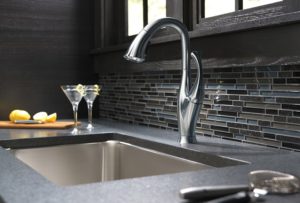Is a Bidet Seat Right for You and Your Bathroom?
From a simple spritz to personalized settings, a bidet seat takes freshening up to another level
Do you need a bidet seat? Well, that’s a matter of very personal opinion. More people are answering “yes.”
If you haven’t tried one, it replaces your existing toilet seat, attaching to the bowl. It draws water from the toilet’s supply line and electricity from a nearby outlet. With the press of a button on a remote, a wand extends beneath you and trains a stream of water powered by an electric pump to clean your underparts. Some have fancy options, such as dryers.
The bidet has come a long way since it first caught on among 17th-century French aristocracy. You can still find the classic porcelain basin that looks like a toilet but sprays clean water, providing a rinse for your backside.
The primary benefit manufacturers tout for all bidet types is an easier-than-wiping cleaning experience.
Japan-based Toto, one of the largest players, selling more than 40 million bidets worldwide since 1980, says demand is exploding from customers in a wide range of income brackets.
“Consumers are expressing their opinion on ecommerce and social media with words of love,” says Bill Strang, Toto USA’s President of Operations and Ecommerce. “It’s better than a television commercial.”
Tushy, one of a group of startups that offers a less expensive product, says it’s sales have doubled in the last year.
A medical expert told CR that bidet users should make sure they pat themselves dry after using one. This protects skin in potentially sensitive areas from problems associated with excessive moisture, says Allen P. Chudzinski, M.D., a colon and rectal surgeon who is a fellow of the American College of Surgeons and the American Society of Colon and Rectal Surgeons.
We don’t currently test bidet seats at Consumer Reports, but we do test toilets, if you want to check out our toilet ratings. Here, we lay out the considerations for anyone contemplating a bidet seat.

Bidet Seats: What You Need to Know
Cost. Prices range from $30 on Amazon for a Brondell bidet seat that simply sprays water to $1,900 for Toto’s top-of-the-line S550e bidet seat with washlet+, which features a warm air dryer and personal memory settings for two users. Some are mechanical rather than electric (utilizing just the water pressure, like your toilet does to flush).
Size. To determine fit, all you need to know is whether your bowl is round or elongated—there are only two types.
Installation. Some manufacturers, like Toto, offer DIY YouTube videos (and in-home service if you aren’t sure about installing). Bidet seats will work with toilets from any manufacturer, but some might not fit perfectly on the bowl—though they’ll still work. Check with the bidet seat manufacturer to ensure that it’s compatible with your setup.
Really, that’s all? A bidet used to be a separate ceramic fixture, and you’d need to remodel and re-plumb your bathroom to install it. You can still do that. You also can buy a toilet with a built-in bidet and hire a plumber to install it, or buy a bidet seat and install it yourself. By far the easiest and least expensive way to bring a bidet into your life is with a bidet seat.
Features. Some bidet seats allow you to change the pressure flow of the stream of water hitting your bottom. Others let you adjust the water temperature or play music for bathroom privacy. Some bidet seats have under-seat lights in case you use the commode in the middle of the night. There are oscillating and pulsing functions. Pressure adjustments. Bottom-drying fans. Memory settings for different users. Some dispense deodorizer. One particularly appealing feature: a seat-warmer function.
What about toilet paper? You’ll probably still need to use some to pat yourself dry, albeit less than you normally would. Some manufacturers, like Tushy, claim their bidet seats result in less toilet paper waste and water use.
Aren’t wipes an easier option? Wipes are cheaper and less of a hassle than a bidet in the short term, but they’ll almost certainly add to your toilet clogs. Furthermore, many colon and rectal surgeons advise patients to avoid wipes, because many contain drying agents, such as alcohol, that can lead to itching and other problems.





